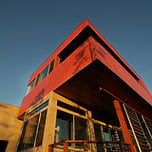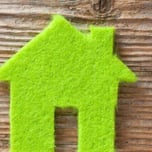- GreenMatch
- Blog
- Top 13 Alternative Housing Ideas
Top 13 Alternative Housing Ideas
With the rise of housing prices and the number of people on Earth having an impact on the environment, we become more and more concerned about leaving our environmental footprints. We, therefore, try to think of more eco-friendly solutions particularly in our everyday life but also, more often, in the process of building our dream home. Sustainable building rapidly becomes the first step to promote the use of renewable resources and renewable energy. After we go green, we no longer see the point in going back!
Green construction has been gaining popularity, as it combines mainstream features (like modern housing ideas, green roofs) with the use of more unique materials like cob, straw, bamboo or wood pallets. Some of the materials are so unusual, that we would never have thought of them when thinking about investing in building a modern and unique house. Typically, what makes a building eco-friendly is the use of structural materials and the attention paid to the usage of energy in the design. Many UK homes have installed sustainable energy solutions, from air source heat pumps (ASHP), electric combi boilers, to uPVC windows.
Green homes can be constructed in a number of very various ways, using materials that don’t seem to be a good fit at first sight - shipping containers or even straw and clay. Read more about unique, eco-friendly and sometimes plain weird alternative housing ideas in this article.
1. Earth Houses
What can be more earth-friendly than the earth itself? Earth houses built with the use of the earth beneath our feet are a perfect example of sustainable construction. And some of the longest lasting buildings still standing are earthen. These building techniques include cob, rammed earth and earthbag buildings. While the first two are made with a particular mix of clay, earthbags are a more modern twist on using the earth as a building material.
Cob House

When we hear “cob house” we may picture a house built with corn cobs. However, we may disappoint you, those aren’t corn cobs. In green construction, 'cob' refers to a material which is a mixture of straw and earth. This design is similar to the adobe homes, however while adobe is formed in blocks and bricks, cob is applied in large handfuls in order to form a unique structure. Houses made with cob usually look like they were made out of clay, but that is probably because they more often than not, are! And don’t be mislead - these buildings can withstand long years to come.
Earthbag

Photos from earthbagbuilding.com
Earthbag homes are not a metaphor for a house built with one huge earthbag, but these homes are build exactly what they sound like - with the use of bags filled with earthen materials stacked to make a house. Earthbags are stacked vertically to make straight or curved walls, or they can be stacked into a dome shaped building that need no additional framing to make a roof. The bags can be filled with a variety of earthy material - for example crushed volcanic rock, which is also an insulation. This kind of construction is very environmentally friendly and very cheap, but they perhaps may not be visual beauties for some.
Rammed Earth

Think of constructing rammed earth homes as building sand castles. But instead of flipping the bucket to form a structure fit for a king, you stuff the soil into the walls that are already in place. The walls are filled with a mix of soils either by hand or a machine. After everything has been packed tightly, the forms are removed and what is left is a very solid, stable earth wall. The process can be repeated until the entire house is built.
2. Wood Houses
Wood is certainly one of the most versatile and common building materials. However, we have to remember that although wood can be called a sustainable material, the over-harvesting and deforestation can exceed the ability of the forests to regenerate themselves. Therefore, when we want to invest in a wood house, we should think of materials such as log or timber, that can be made with certified sustainably harvested trees or with the use of sustainable building methods.
Cordwood

Cordwood is a sustainable building method that uses short sections of trunks and tree limbs, which would normally be used for firewood. There are all kinds of materials we can include in this building method - in the picture we see a wall with glass bottles. With this kind of building method we can utilise a large percentage of any given tree and use many species of trees that would not be typically used for construction purposes. Cordwood walls are also an excellent insulation and provide the natural balance between the thermal mass and insulation, without the need of using any further methods inside or outside the house.
Log House

A log house is structurally very similar to a log cabin. However, due to the fact that the term “log cabin” is generally referred to small, rustic hunting cabins, it is not preferred by most contemporary builders. Log houses are usually made with logs that have not been milled into conventional lumber.
Timber Frame

A timber-framed home is an excellent celebration of wood on a massive scale. Timber framing construction is a building method that utilise heavy timber rather than dimension lumber.
Tree-house Homes

Probably most of us dreamed of having a tree house as our safe heaven as a kid. Some of us still do. Luckily, the treehouse is no longer a child’s club house away from pesky parents. We can now fulfil our childhood dreams and move into a tree-house home, which is no longer perceived as exotic, but rather as an everyday part of life.
3. Straw Houses

Straw has all kinds of benefits - it’s inexpensive and provide excellent insulation. These qualities make straw construction a green-building method. More importantly, straw bales are a byproduct of grain farming, therefore building straw houses is a great way of reusing something that would normally go to waste.
4. Bamboo Houses

Bamboo houses are an even more eco-friendly alternative to building with timber. Bamboo is a very strong material to build with and well-constructed bamboo homes are said to withstand hurricanes and earthquakes.
5. Stone Houses

Stone houses are about as sustainable as it can get. Build with rocks, stone houses have their natural beauty and don’t require additional painting. They can be built with the use of local materials and are very comfortable. With the use of a passive house design, stone homes can store heat within its walls. And although stone homes may seem like an idea from the Dark Ages, it is certainly a bright, sustainable idea.
6. Tiny Houses

Those tiny houses have one great advantage - they are extremely environmentally friendly. And lovely! But most importantly environmentally friendly. A tiny house can be built with the use of green building materials or recycled supplies. These compact houses are so small that they don’t require sophisticated heating and cooling solutions, and can be easily moved to a different location and are designed to reduce our carbon footprint.
7. Shipping-crate Homes

This kind of construction is gaining popularity, as shipping-crate homes has become a trendy way of living. Not only that - shipping-crate homes are cheaper than conventional homes and the finished structure has a unique and very modern, industrial look. Their small size makes these tiny-homes a green construction method, and some enthusiasts go even as far as making them even more eco-friendly with solar panels, green insulation and rainwater-harvesting systems.
8. Wood-pallet Houses

These homes were designed as an affordable solution for disaster relief housing. But with the eco-friendly aspects of wood-pallet housing it can also be designed to create something more permanent. Wood pallets are extremely cheap to buy and readily available. This material is reusable, easy to recycle and easy to combine in order to create a unique, modern and energy-efficient home.
9. Green Roof Homes

Green roofs are known as an amazing architectural feature but this method has more benefits to it than just visual aspects. Green roofs can aid in managing stormwater runoff and helps to reduce the urban heat-island effect. This roof construction solution reflects heat rather than absorbing it like a regular roof, and helps with lowering a building's cooling costs. They are also great insulators while requiring very little maintenance. And let’s face it - it looks great!
10. Earthship

Although at first sight an earthship sounds more like a UFO than a construction method, earthships are actually a form of eco-friendly housing, that becomes more and more popular around the world. This kind of construction relies on reusing bottles and tin cans that would normally find their way into landfills.
11. Hemp Concrete Homes

Due to the fact that traditional concrete is very energy intensive to create, hemp concrete was developed in order to work as an alternative. Hemp concrete is a mixture of hemp, water, and limestone that is, surprisingly, more durable than regular concrete. Walls made with this material are said to be resistant to fire, mould, and insects. Hemp concrete may, however, be more expensive than regular concrete due to the fact that hemp is illegal to grow.
12. Modular Homes

Modular homes are no longer prefabricated houses some might be familiar with. Nowadays, modular houses are built with a modern look and an environmental twist. Those eco-friendly homes are typically smaller than traditional houses, therefore they use much less energy to heat and cool.
13. A Hobbit House

Now this is a symphony of unique, dreamy and environmentally friendly factors, isn’t it?
We strive to connect our customers with the right product and supplier. Would you like to be part of GreenMatch?





